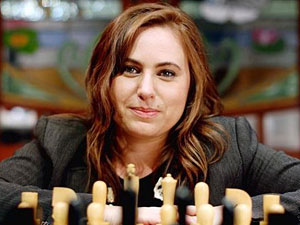


Winning starts with what you know
The new version 18 offers completely new possibilities for chess training and analysis: playing style analysis, search for strategic themes, access to 6 billion Lichess games, player preparation by matching Lichess games, download Chess.com games with built-in API, built-in cloud engine and much more.
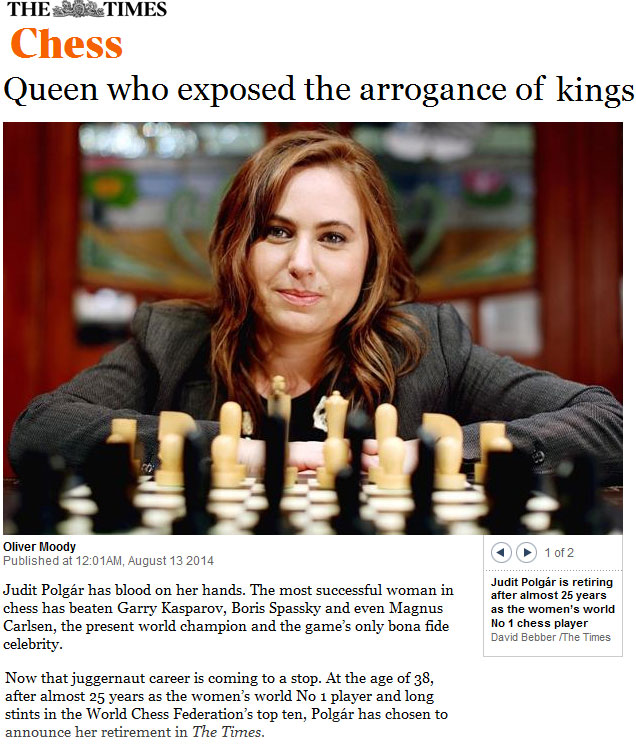
The following texts and images have appeared in various pieces in the last decade on our news page – usually on Judit's birthdays, or when her children were born. Some of our readers are bound to know the stories, but just the number of readers we now have as compared to the time when the articles were originally published tell us that there are plenty who do not. So here's looking back at a remarkable chess personality and chess career.
I first met the Polgar family some thirty years ago, in Budapest in 1983. Acutally I went over to their flat to talk to Zsuzsa, who was the 14-year-old rising star of women's chess. I was introduced to László Polgar, the father who had initiated the chess boom in the family; his wife Klara, who speaks many languages (including all of those I speak); and two little girls, the younger sisters of Zsuzsa (Susan) Polgar.
Susan Polgar with her little sisters, who are obviously interested in chess
It was during the World Microcomputer Chess Championship, and I spoke at length with Susan. I asked her about her cute little sisters. "Do they also play chess?" She smiled and answered simply "Sure." Later I invited Susan to play a game against one of the strongest chess programs in the world at the time. "Let my sisters play," she said.
And play they did, against the Fidelity computer that went on to win the Word Micro Computer Chess Championship. I was called away before the first game ended. After the second I returned and asked Fidelity programmer Kathe Spracklen (operating the program in the picture above), tongue-in-cheek, whether the girls had beaten the computer. "Of course not," she replied, "they did not beat it. How could you imagine that? They are just babies. No, they did not beat it, they murdered it, they tore it to bits, they chewed it up and spat out the pieces, they massacred the thing!" Never before or since have I seen a chess programmer so flushed with pleasure at the defeat of his or her program.
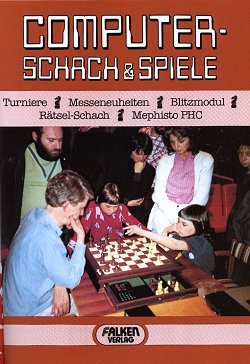
This picture of the girls playing a computer appeared on the cover of a German computer chess magazine. It shows Sophie Polgar playing the runner-up Mephisto computer, with Judit and her father (standing on the left) watching.
"So they are very strong players?" I said to Susan, after seeing them defeat the world's best computers. "Yes, especially the little one," she answered. "Watch out for her, she will be the strongest of the three of us!"
In the following years I was in Budapest a number of times, almost always staying in the Polgars' flat. I slowly began to see that Judy was really something special. I remember late one night when Susan was analysing with a trainer, a strong IM. They reached an endgame and could not figure out how to play it. "There is some trick here," said the IM. So they woke up Judit and carried the girl into the training room. Judy, still half asleep, rubbed her eyes, showed them the win and was put back into her bed.
A few years later we went to see FIDE president Florencio Campomanes in his hotel suite in Budapest. The Polgars were having a lot of trouble with the Hungarian Chess Federation, so that the meeting has somewhat touchy overtones. To break the ice Campo suggested some blitz games, where he had a fair reputation.
László Polgar offere him blindfold games against his youngest daughter. Judit sat with her back to the board, streching her hand behind her to operate the clock. László dictated Campo's moves to Judit, who at the time spoke only Hungarian. They played two or three games in this fashion. If you want to know the result, look carefully at Campo's face and see Kathe Spraklen's memorable quote above.
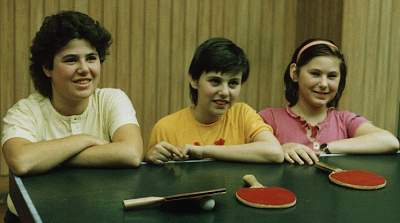
Ping-Pong players Susan, Sophia and Judit Polgar
The three Polgar girls were also keen table tennis players. The first time I played against Judit I managed to win. The look on her face was unequivocal: I'm gonna come back and I'm gonna kill you, buddy. She started taking lessons from a professional and the next time I faced her she pulled out a devastating top spin. The result: once again cf. Kathy Spracklen above.
For a long time I was only able to communicate with Judy with tickles and shoves. A common dialog during walks along the Danube River in Budapest went as follows:
Susan: "Stop it, Judit, behave yourself!"
Judit: "But he started! I'm just fighting back."
All of this in Hungarian. Then one day, in May 1989, the four Polgar women (Klara and her daughters) visited my home south of Hamburg. And Judit beamed at me: "I can speak English now, Frederic." She spoke an unambitious but expressive English. Since then we have been real friends.
It was a lovely summer in 1989, and the two younger sisters Judit and Sophia spent much of their visit in a hammock in the garden, reading Hungarian teeny magazines.
Of course Judit was equally ambitious in garden badminton.
Sophie and Judy in the typical position for watching TV
Sometimes the three Polgars experimented with my chess computers,
which had of course in the meantime become very much stronger.
There is one story that must be told. At the time of that visit my son Martin had a white rat, appropriately named Basil. It was a gentle creature, but all the Polgars were terrified of it. Except Judit, who would take Basil up and try to force her sisters and her mother to pet it.
Judit and Sophia on the garden terrace, with Martin and Basil the rat
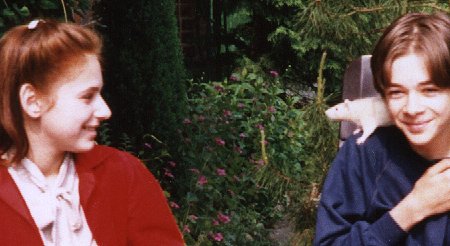
If you look carefully you can see the obvious affection between Judy and Basil
Well, Basil was used to certain rituals. Every morning when Martin came down for breakfast he would give Basil a morsel of rat food. You know, a piece of leftover pizza, salami or a Dorito chip. Basil would eagerly wait for this treat, pacing around in its cage in anticipation. The animal had, however, one concern in life: that one day its owner would stick the food into the cage and then suddenly change his mind and pull it out again. So when it appeared between the bars Basil would grab it with both front legs and teeth, and actually lie on its back until Martin moved away and the coast was clear to roll over and enjoy the treat.
One morning it was Judit who came down first. She went over to Basil and, with the words "Hello little ratty", she stuck her finger into the cage. The rest is too grusome to narrate. Just that Judy put a plaster over the wound and was convinced that she was going to die. But she never told anyone what had happened, only the next day, when it became obvious that she would live and the bite was not so bad after all.
In closing here's an interesting picture from 1993 – Judit playing against an early version of Fritz on a notebook, with some Indian dude watching. Judit managed to lose one of the games, upon which the Indian GM grabbed me and physically pinned me to the floor. He kept shouting "Quick, Judit, press Ctrl-N", while I shouted "Press Ctrl-S, press Ctrl-S!". Unfortunately she pressed Ctrl-N.
Judit Polgar, born on July 23, 1976, is certainly the the strongest female chessplayer of all time. She has always insisted on playing in men's (actually: unrestricted) events, with the clear goal of going for the World Championship title, and never tried for the Women's world title (her sister Zsuzsa won that). Judit achieved the GM title in 1991 at the age of 15 years and 5 months, beating the previous record for youngest Grandmaster, set by Bobby Fischer in 1958.
Pictures of Judit taken from the ChessBase Players Encyclopedia.
They are dated 1988, 1989, 1993, 1996, 1996 (the famous hat picture) and 2002.
All the world's leading players have suffered losses to Judit Polgar, including former world champion Garry Kasparov. In 2003 she came clear second in the Category 19 Corus chess tournament in Wijk aan Zee, Netherlands, undefeated and just a half-point behind Viswanathan Anand, and a full point ahead of classical chess world champion Vladimir Kramnik.
On the current Summer 2007 FIDE rating list Judit was ranked 17th in the world, with a rating of 2710. Her highest rating was achieved in the July and October FIDE lists, with 2735. In both lists she appeared on place eight of all chess players in the world.
The above graphic shows Judit Polgar's current and her highest rating
(light area on top), compared to the top female players in the world today.

Above is Judit's rating progress from 2001 until today [source: FIDE]
On August 10th, 2004, Judit give birth to her son Olivér. She returned to chess at the Wijk aan Zee chess tournament in January 15 2005, where she scored 7/13 for a shared 4th place. In May 2005 she shared 4th at the category 20 Mtel Masters. In September 2005 Judit became the first female player in history to play for for the World Chess Championship title. Her performance was disappointing, and she came last out of the eight competitors.
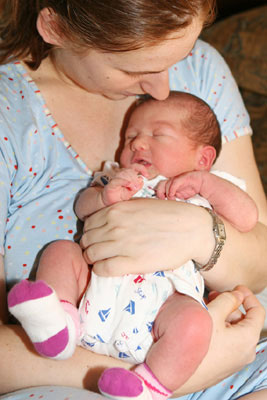

On July 6th, 2006, Judit's second child was born: baby Hanna entered the world at 3.5 kilos.
On the right we see her giving son Oliver a first (modestly successful) lesson in chess
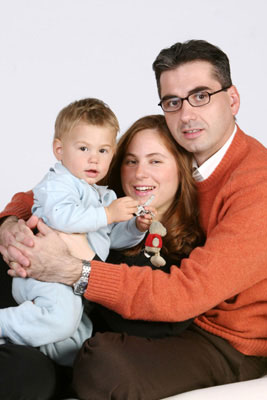

With Oliver and husband Gusztav ("Guszti") Font + a family outing in the park
Sister Susan (Zsuzsa), father Lászlo, mother Clara, Judit and Oliver
All pictures in the second part above were provided to us by Tímea Jaksa